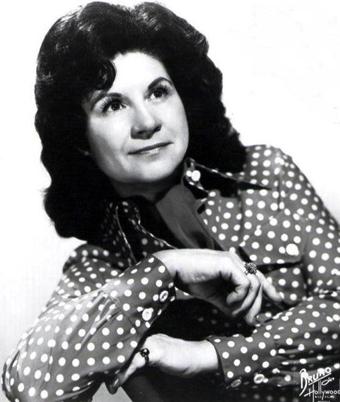Gone but Not Gone, Their Music Plays on: Kitty Wells, Bob Babbitt
By • July 20, 2012 0 1591

Whenever a music maker—singer, player, twanger, jazz man, country star, doesn’t matter—passes on, the event has the odd effect of making their music rise up as memory, as vivid as ever, as suddenly as a stray thought.
Kitty Wells died at the age of 92 a few days ago, and Bob Babbitt died at the age of 74 this week. You couldn’t think of two more different people if you had to work at it. It’s hard to imagine the gap between the kind of music they made. And yet, the music is the bridge you want to cross, and go back and forth on.
Wells was a pioneer, a major star in the firmament of country music female stars, true blue and gritty, she was not only was the first major female country star, she practically invented a whole genre that swirls with a lot of tang and bite around the subject of husband and wives, faithless men, dangerous other women and booze, as in her greatest and most enduring hit single, “It Wasn’t God Who Made Honky Tonk Angels.”
Babbitt was a bassist, one of the great accompanists to Motown music and stars, a member in very good standing of a group of musicians of Motown musicians who garnered the Funk Brothers nicknamed the Funk Brothers.
Wells rose to stardom in the 1950s, an era when country music was dominated by male stars, from Roy Acuff to the flame-out Hank Williams, who sang a lot about honky tonk women and booze (and spent a lot of time with both until he died of it all). Wells—her real name Muriel Ellen Deason from Nashville, Tenn.—got married at 18 to Johnny Wright, who had a duo named Johnny and Jack , but then worked with his wife and became Johnny Wright and the Harmony Girls. It was an enduring marriage that lasted until Wright died at the age of 97.
Wells’s ascendancy to stardom with “Honky Tonk Angels” inspired a host of later top stars like Loretta Lynn, Patsy Cline and, most notably, Tammy Wynette, all of whom were noted for their songs about adultery, heartbreak and can’t-help-loving-that-man-until-I-kick-him-out songs as in “”It wasn’t God who made honky tonk angel . . . too many times married men think they’re still single that has caused many a good girl to go wrong” or Lynn’s famous songs, “Don’t You Come Home From Drinkin’ With Lovin On Your Mind.”
With an authentic and straightforward voice, Wells could break a woman’s heart and shame a man’s. Her own life was as wholesome as a Betty Crocker cover story which made her songs all the more powerful. Her career lasted for a long time, and she still made public appearances late in her rich life. She had other hits, such as “I Can’t Stop Loving You,” “Making Believe,” “A Woman Half My Age” and the wonderfully titled “Will Your Lawyer Talk to God?”
I had my newspaper open to the obituary page, while riding the bus, and a woman tapped me on the shoulder. “That’s one of the Funk Brothers, there,” she said, pointing to the story on Bob Babbitt’s death. “Did you know him?” I allowed that I had never heard of him. “Well, him and the rest of the Funk Brothers they were on all the great Motown records, and they worked with all the Motown stars, like Smoky Robinson and Marvin Gaye. They made a movie about them.”
Babbitt—and the other Funk Brothers, guitarists Robert White and Joe Messina, keyboardists Joe Hunter and Earl Van Dyke and drummers Benny Benjamin, Richard Allen and Uriel Jones—was one of the members of a wide group of musicians, uncredited more often than not, that were a vital part of almost every single ever made. Listen to Gladys Knight and the Pips’ “Midnight Train to Georgia” or Robinson’s “Tracks of My Tears” or the Temptations or Stevie Wonder or Del Shannon’s “Little Town Flirt,” and you’ll hear Babbitt and the rest. Babbitt was one of the few white musicians backing up Motown musicians and in that sense he reflected the instrument he played, in blending in with the whole. His presence, and his talent, showed the durable power of music as bridge and respect builder.
Bass notes should be invisible, in a way. They make you remember just as Wells songs make you remember twang instead of twitter. Check YouTube—Wells is there and so are the Funk Brothers and the music lives again, rises up rough and scratchy

